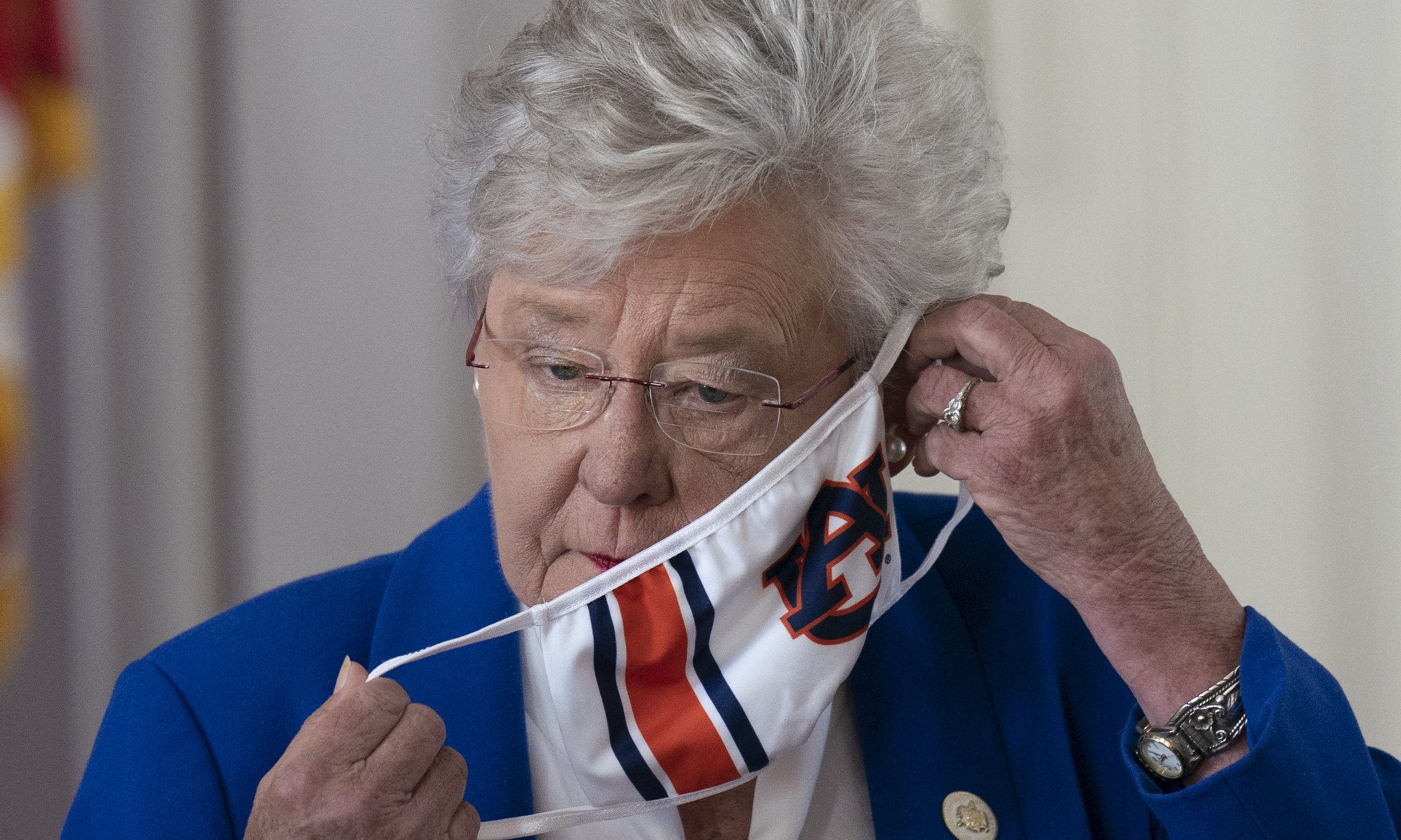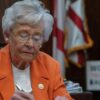Alabama Gov. Kay Ivey told reporters Thursday she has no plans for new restrictions on businesses despite the state recording record high new COVID-19 cases and hospitalizations Thursday.
“We’ve been dealing with this thing for quite some time,” Ivey said, according to AL.com. “Several months. We know what to do, what works. I have no plans to shut down any businesses. No plans to shut down businesses. They’re doing a good job of protecting their patrons. We need to keep our folks working and earning a living.”
Ivey was speaking to reporters after a ceremony at the National Guard headquarters in Montgomery, according to the news outlet.
“So yes, the numbers are rising. We know what to do. We know that the masks and social distancing and personal hygiene works. Folks, just keep it up. We’ll get through this. The vaccine’s coming,” Ivey said.
The Alabama Department of Public Health reported a record high 3,531 new cases Thursday, and the state has averaged 2,461 cases each day for the last two weeks, a 28 percent increase over the previous two weeks.
The number of people in Alabama hospitals with COVID-19 on Thursday reached a record high 1,827. That’s nearly 40 percent higher than two weeks ago. Huntsville Hospital had a record-high 338 COVID-19 patients on Thursday, after a string of record-setting daily hospitalizations. UAB Hospital was caring for a record 127 COVID-19 patients Wednesday and 125 on Thursday.
Ivey issued a statewide mask order in July, when the state was experiencing a surge in coronavirus and hospitals were beginning to be stressed with an influx of COVID-19 patients. She extended that order several times, but it’s set to expire Dec. 11, if she doesn’t extend it again.
After a peak of new daily deaths on July 31, which was nearly two weeks after Ivey’s mask order, the number of Alabamians dying each day from COVID-19 began dropping significantly, according to data from the Alabama Department of Public Health.
In April, Ivey decided to extend her “stay at home” order, which included closures of non-essential businesses, and told reporters that “all of our decisions that I’m going to make are based on data. Not a desired date.”
Ivey on Nov. 5 relaxed restrictions on businesses, including capacity limits inside retailers, entertainment venues and gyms, and eased social distancing requirements in restaurants, barbershops, salons and gyms, with restrictions.
“Simply put, this should be welcome news as we get ready for the upcoming holiday season, which is often the bread and butter for retail, and especially for locally-owned small businesses,” Ivey said at the time.
Asked by a reporter on Nov. 5 how Ivey came to decide to loosen restrictions for business amid growing COVID-19 cases, Ivey said: “Well, we’re just gonna have to encourage people to wear their masks, social distancing and practicing precautionary protocols to stay safe.”
Public health experts say it takes around two weeks after a change, such as a mask order, to begin noticing differences in new cases, hospitalizations and deaths. Deaths are an indicator that lags even further behind new cases and hospitalizations, however.
During the two weeks leading up to Ivey relaxing those restrictions on businesses on Nov. 5, Alabama added 22,094 cases. In the two weeks following her decision, the state added 26,752 cases. During the next two weeks, the time frame during which public health experts believe results of such changes can become evident, Alabama added 34,449 cases, a nearly 60 percent growth in cases from the two weeks prior to Ivey relaxing restrictions.
“It must be made clear that if you are over 65 or have significant health conditions, you should not enter any indoor public spaces where anyone is unmasked due to the immediate risk to your health,” a report from the White House Coronavirus Task Force on Sunday reads. “You should have groceries and medications delivered.”
Dr. Jeanne Marrazzo, director of UAB’s Division of Infectious Diseases, told reporters Tuesday that there is a possibility that hospitals will have to set up mobile hospitals to care for the rush of patients, and that she worries hospitals may not have enough staff to care for “what might be a tidal wave of patients in the next month.”
Centers for Disease Control and Prevention Director Robert Redfield made a dire prediction Wednesday.
“The reality is December and January and February are going to be rough times. I actually believe they’re going to be the most difficult time in the public health history of this nation,” Redfield said.



















































